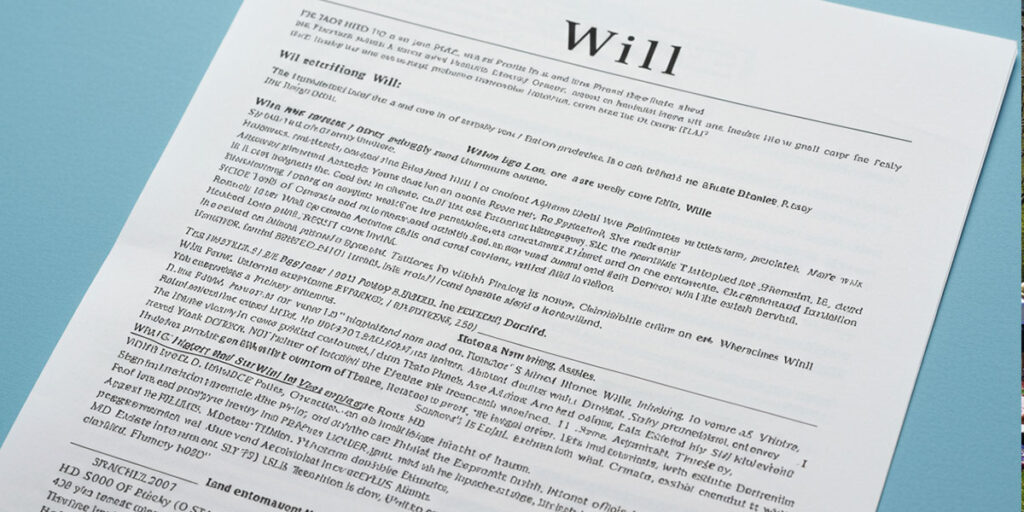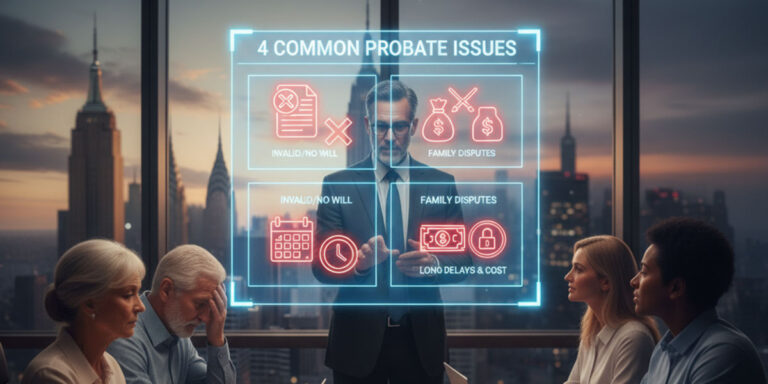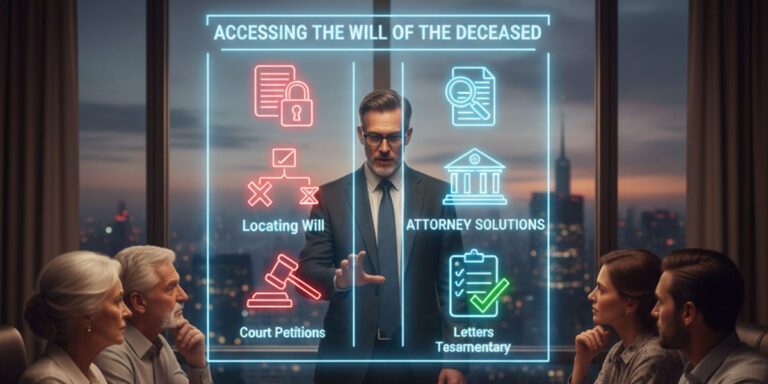The Great Misconception: Why Your Will is the Key TO Probate Court, Not a Way Around It
It is, without a doubt, the single most widespread and dangerous misconception in the entire field of estate planning. It is a belief held by millions of well-intentioned New Yorkers: that by creating a Last Will and Testament, they have created a shield that will protect their family from the dreaded court process known as probate. They sign their will, file it away, and rest easy, believing they have provided for a smooth and private transfer of their legacy. The reality is the precise and shocking opposite. A will does not avoid probate; a will guarantees it.
As a New York estate planning attorney with more than three decades of experience, I have had the difficult task of explaining this counterintuitive truth to countless grieving families. The moment of realization—that the document they thought was a private instruction manual is actually the primary ticket to a public court proceeding—is often one of shock and dismay. At Morgan Legal Group, we believe that eradicating this myth is a public service. This definitive guide will pull back the curtain on the New York Surrogate’s Court system. We will explain exactly what probate is, why a will is its central focus, and, most importantly, illuminate the powerful, attorney-guided strategies that can *actually* keep your family out of court.
What is Probate? Understanding the Court’s Role
Before we can understand why a will is intrinsically linked to probate, we must first have a clear definition of the process itself. Probate is the formal, court-supervised legal process that is used to validate a deceased person’s will, appoint their chosen Executor, and oversee the administration and distribution of their estate. It is the legal mechanism for winding up a person’s final affairs under the watchful eye of a judge in the Surrogate’s Court.
The Necessary Functions of the Probate Court
While often seen as a bureaucratic hassle, the probate process serves several critical functions designed to protect the integrity of the estate and all parties involved.
- To Authenticate the Will: The court’s first and most important job is to determine if the will presented is, in fact, the true, final, and legally valid Last Will and Testament of the decedent.
- To Appoint the Executor: A will *nominates* an Executor, but it does not grant them any power. The court formally appoints the Executor by issuing a document called “Letters Testamentary,” which is the legal proof of their authority to act.
- To Protect Creditors: Probate provides a formal process for any creditors to make a claim against the estate for legitimate debts owed by the deceased.
- To Supervise Asset Distribution: The court ensures that the Executor properly gathers assets, pays debts and taxes, and distributes the remaining property to the beneficiaries exactly as the will instructs.
- To Resolve Any and All Disputes: If an heir wishes to challenge the will (a “will contest”) or if beneficiaries disagree, the court provides a legal forum to resolve these conflicts.
Understanding these functions is the key to understanding why a will cannot simply be a private document. It is a set of instructions that requires a court’s authority to be carried out.
The Will’s True Purpose: An Instruction Manual FOR the Court
The most accurate way to think of your will is not as a way to avoid the courthouse, but as a meticulously prepared legal brief that you are submitting *to* the courthouse. It is your personal set of instructions for the judge and your chosen Executor, designed to guide every step of the probate process.
The Journey of a Will Through the Court System
The probate process begins when your nominated Executor files a “Petition for Probate” with the Surrogate’s Court in the county where you resided (for example, in Brooklyn). This legal package includes:
- The original will (a copy is not sufficient).
- A certified copy of the death certificate.
- The formal petition, which contains information about you, your assets, and your heirs.
- Affidavits from the witnesses who observed the will signing.
Once this is filed, legal notice must be given to all of your “distributees”—your legal next-of-kin who would inherit if you had died without a will. This notice gives them their legal opportunity to come to court and object to the will. Only after the court is satisfied that the will is valid and all interested parties have been notified will it issue Letters Testamentary and allow the process to move forward.
The crucial takeaway is this: your will is the centerpiece of this entire court proceeding. It has no legal power on its own. It is the probate process that breathes legal life into it.
The Real Question: If a Will Guarantees Probate, What Actually Avoids It?
This is the empowering part of the conversation. While a will subjects your estate to probate, proactive and strategic estate planning can make the probate process entirely unnecessary. The key is to structure the ownership of your assets in such a way that they pass to your heirs automatically, by “operation of law,” without needing a court’s intervention.
The Power of “Non-Probate Assets”
The entire strategy of probate avoidance revolves around transforming your “probate assets” into “non-probate assets.”
- Probate Assets: Property titled in your name alone.
- Non-Probate Assets: Property that has a pre-determined, automatic path to a new owner upon your death.
Strategy 1: The Revocable Living Trust – The Gold Standard
The most comprehensive and effective tool for avoiding probate is the Revocable Living Trust. A trust is a private legal entity you create to own your assets. By “funding” your trust—that is, re-titling your house, bank accounts, and other assets into the name of the trust—you remove them from your personal name. As a result, they are no longer probate assets. Upon your death, your chosen successor trustee can privately and efficiently distribute these assets according to your trust’s instructions, completely bypassing the Surrogate’s Court. This is the heart of a modern will and trust plan.
Strategy 2: Beneficiary Designations – Simple but Powerful
Assets like life insurance policies, IRAs, 401(k)s, and other retirement accounts are non-probate assets because they are controlled by beneficiary designations. These designations are a contract with the financial institution and **supersede your will**. Keeping these updated is a critical part of any estate plan.
Strategy 3: Joint Ownership and TOD/POD Designations
Owning property jointly with rights of survivorship or adding a “Payable on Death” (POD) or “Transfer on Death” (TOD) designation to an account can also avoid probate for that specific asset. However, these methods are fraught with risks—such as loss of control and exposure to the joint owner’s creditors—and are generally inferior to a trust. A skilled attorney like Russel Morgan, Esq., can explain these dangers.
The Critical Role of the Will, Even When Avoiding Probate
Even if you have a sophisticated trust-based plan designed to avoid probate, a will remains an absolutely essential document. This special type of will, called a “Pour-Over Will,” serves two vital functions:
- It acts as a safety net to “catch” any assets you forgot to fund into your trust and directs them there after your death.
- Most importantly, it is the only document where you can nominate a guardian for your minor children, a crucial aspect of guardianship planning.
This illustrates how a comprehensive plan from a firm like Morgan Legal Group integrates all the necessary tools for complete protection.
The Dangers of Misunderstanding: The True Cost of the Myth
Believing that your will avoids probate leads to a false sense of security. You may fail to take the necessary steps to create a trust or properly title your assets, leaving your family to face the very court process you thought you had protected them from. The cost of this misunderstanding is measured in:
- Time: Months or years of delay for your heirs.
- Money: Significant fees and costs paid from their inheritance.
- Privacy: The public exposure of your family’s financial affairs.
For more on this topic, authoritative third-party sources like the New York State Unified Court System offer good foundational information, but cannot replace strategic legal advice.
Conclusion: The Right Tool for the Right Job
So, does a will keep an estate from going through probate in New York? The answer is a clear and definitive no. A will is your essential instruction manual *for* the probate court. It is a tool for controlling the *outcome* of probate, not for avoiding the process itself.
The good news is that probate is not inevitable. With proactive, intelligent planning guided by an experienced estate planning attorney, you can structure your affairs to make the probate process entirely unnecessary for your loved ones. This is the true goal of a modern, sophisticated estate plan.
At Morgan Legal Group, we specialize in dispelling these dangerous myths and designing custom-tailored plans that achieve our clients’ goals. We can help you build a fortress of protection around your legacy that keeps your family out of court. If you are ready to learn the truth and take control of your future, we are here to help. Contact us today to schedule a consultation. You can see what our many satisfied clients have to say about our work on Google.





